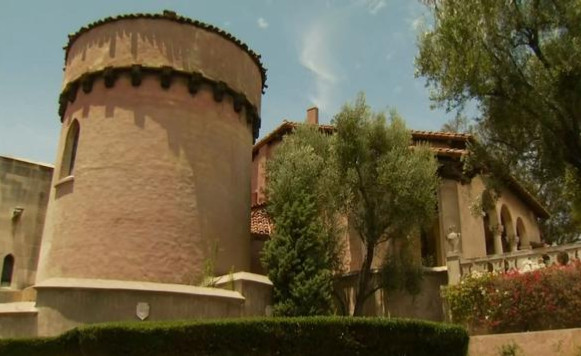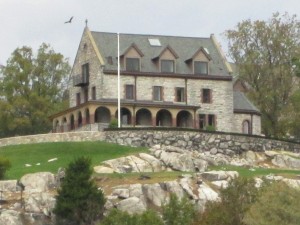Considering the Crusades and other religious wars, this one is relatively tame. A convent that formerly housed the Sisters of the Most Holy and Immaculate Heart of the Blessed Virgin Mary was put up for sale in Los Angeles. Developer Dana Hollister purchased the property from the nuns, with the intent to rezone it for commercial use and convert it into a restaurant and boutique hotel. (Interesting side note, Hollister is also behind recently-opened Osso, a restaurant in a downtown building that legend has it was originally a brothel.) Talk about opposite ends of the spectrum!

Sisters of the Most Holy and Immaculate Heart of the Blessed Virgin Mary Convent Property, Los Feliz, Los Angeles, CA
However, the Archbishop of Los Angeles also sold the convent property to singer Katy Perry, and filed suit against the nuns on the grounds that they did not own the property and therefore couldn’t sell it. The nuns have countersued, and also stated that they don’t want to sell the property to Perry because of her public image.
The fate of the building itself is more interesting than the drama of the rich and famous. Several convents and abbeys have been or are planned to be converted to hotels and restaurants, as Hollister would like to do to Los Feliz. The convent of St Mary in Peekskill, New York, whose development has been slowed or stopped since 2008, now has a new plan proposed by Martin Ginsberg. While not a convent or abbey in the strictest sense of the word (it was never consecrated), Glenlo Abbey in Galway has been operating as an inn and restaurant since the 1980s. In Austria, St Peter’s Stiftskeller, located in St Peter’s monastery, has been operating as a restaurant since 803. No, we didn’t leave the “1” off that number, we mean 803, as in more than 1200 years ago.
Monetizing convents, abbeys and monasteries may be most widespread in Italy – I know that this sort of Monastery AirBNB website, “Monastery Stays”, has enabled many of these religious orders to connect up with travelers that are looking for inexpensive, and often austerely monk-like accommodations along with unique cultural experiences while vacationing. Monastery Stays allows one to search in one place for convents, monasteries and other guest-houses that allow in visitors, and this has allowed many abbeys and convents to easily obtain access to commercial income.
Convents are not just repurposed into hotels and restaurants. In Cleveland, some vacant convents now house the homeless who are transitioning into productive, independent lives, some by working as subcontactors on other convent conversions. In Quebec, one convent has become City Hall.
It is always nice to see historic buildings preserved, restored, or repurposed. Fortunately, it looks as if Los Feliz will not face demolition no matter who wins this real estate battle, and we will watch its transformation with keen interest, whether it becomes a private sanctuary or a business to be enjoyed by the public.



Recent Comments